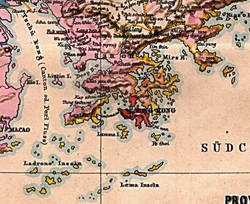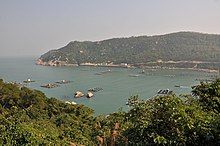Wanshan Archipelago
Wanshan / Guishan / Dangan
万山镇 / 桂山镇 / 担杆镇 | |
|---|---|
| 万山海洋开发试验区 | |
 Ladrones Islands and Lema Islands (bottom part of the map) on an 1878 German map | |
| Coordinates: 21°59′42″N 113°45′54″E / 21.99500°N 113.76500°E | |
| Country | China |
| Province | Guangdong |
| City | Zhuhai |
| District | Xiangzhou |
| Area | |
• Total | 86 km2 (33 sq mi) |
| Population | |
• Total | 4,813 |
| • Density | 56/km2 (140/sq mi) |
| Time zone | UTC+8 (China Standard) |
| Website | http://www.wanshan.gov.cn/ |
| Wanshan Archipelago | |||||||||||||
|---|---|---|---|---|---|---|---|---|---|---|---|---|---|
| Simplified Chinese | 万山群岛 | ||||||||||||
| Traditional Chinese | 萬山羣島 | ||||||||||||
| Literal meaning | Myriad[a] Islands Archipelago | ||||||||||||
| |||||||||||||
The Wanshan Archipelago, formerly known as the Ladrones Islands, is a 104-island archipelago that is a part of Xiangzhou District in Zhuhai, Guangdong Province, China.
Administration
[edit]Most of the islands of the archipelago are in the Wanshan Marine Development Experimental Zone (万山海洋开发试验区) which consist of three towns:[1] Guishan Town (桂山镇), Dangan Town (担杆镇) and Wanshan Town (万山镇).
Before Chu-Hai County was created in 1953, the islands were part of Po-On County.[2][3]
Geography
[edit]The islands are situated in the South China Sea, to the south of the opening of the Pearl River estuary and Hong Kong.
The archipelago includes several groups of islands. The western group, located south of the Pearl River estuary and Lantau Island, was formerly known to Europeans as the Ladrones, from the Spanish for "thieves". It comprises Greater Wanshan, Guishan, and Wai Dangling Islands and the Zhizhou, Sanmen, and Aizhou groups. The eastern group, located south of Hong Kong Island, was known as the Lema Islands. Today, they are known as the Jiapeng Liedao and Dangan Liedao, respectively.
The largest island, Dangan, features mountainous terrain similar to Hong Kong.
List of islands
[edit]

Islands of the archipelago include:
Dangan Liedao (担杆列岛), the eastern group of Wanshan archipelago, and the eastern half of the former Lema Islands chain
- Dangan Dao (担杆岛), 13.2 km2 in area and the largest of the islands; 200 permanent residents mainly along Zhangmu Bay and Hengkeng.
- Erzhou Dao (二洲岛), 8.15 km2
- Zhiwan Dao (直湾岛), 4.5 km2
- Xidan Dao (细担岛), 0.85 km2
Jiapeng Liedao (佳蓬列岛), the southern group of Wanshan archipelago, and the western half of the former Lema Islands chain
- Eyan Shi Dao (枙咽石岛, O-yen Shih). A 39 m high islet about 1 mi (1.6 km) north of Beijian Dao.[4]
- Beijian Dao (北尖岛), 3.17 km2. Two peaks rising almost perpendicularly to a height of 300 m on the southwestern end of the island, are known as Asses' Ears.[4]
- Miaowan Dao (庙湾岛), 1.46 km2 in area.[5] 240 m high.[4] It has a small population of fishermen.[5]
- Shan Zhou (杉洲), 0.16 km2
- Wanzhou Dao (湾洲岛)
- Huangmao Zhou (黃茅洲)
- Ping Zhou (平洲), 0.144 km2
- Wenwei Zhou (蚊尾洲; 'Mosquito Tail Island', also Gap Rock in English), 0.022 km2. The small island is in the form of two hillocks, about 24 to 30 m (80 to 100 ft) high, and the island derives its English name from the gap between them.[6] The Gap Rock Lighthouse (蚊尾洲燈塔) on the island was built to serve as a navigation aid to vessels sailing to Hong Kong. It was built by a Hong Kong contractor[which?] and partly funded by the Imperial Qing Government for both construction and maintenance costs. Besides the lighthouse it had separate European and Chinese[clarify] living quarters, telegraph and storage rooms.[7] It came into operation in 1892 under Hong Kong control (island still under Chinese sovereignty) staffed by British lighthouse keeper and Chinese[clarify] assistants. The lighthouse lenses and windows were damaged by typhoons in 1893 and 1905, the keepers eventually abandoned the site, civil war in China left it in ruins by the 1930s and 1940s. Taken over in 1949[clarify] by the Communists in Beijing, lighthouse was restored in 1986 with solar panels and fully automated.[8][9][10] A small helipad was added in by the Chinese.[when?][citation needed]

Southwestern group:
- Dawanshan Dao (大万山岛), 8.07 km2. The seat of Wanshan Town (万山镇) of Zhuhai is located on the island
- Xiaowanshan Dao (小万山岛), 4.35 km2.[11]
- Baili Dao (白沥岛), 7.94 km2
- Dong'ao Dao (东澳岛), 4.62 km2 in area with population of 500. Club Med opened a holiday resort on the island in 2014.[12]
- Heng Zhou (横洲), 0.54 km2
- Zhu Zhou (竹洲; 'Bamboo Island'), 1.66 km2
- Gui Zhou (贵洲), 0.32 km2
- Dalie Dao (大烈岛), 0.36 km2
- Huangmao Dao (黄茅岛), 1.08 km2

Central group, located south of Lantau:
- Wai Lingding Dao (外伶仃岛), 3.7 km2 in area and a tourist attraction with natural sites (Dangandao Provincial Nature Reserve) and temples. The seat of Dangan Town (担杆镇) of Zhuhai is located on the island
- Sanmen Liedao (三门列岛)
- Hei Zhou (黑洲)
- Henggang Dao (橫崗島), 0.74 km2
- Sanmen Dao (三门岛), 0.98 km2
- Sanmen Zhou (三门洲)
- Yuangang Dao (圆岗岛), 0.016 km2
- Zhuwantou Dao (竹湾头岛), 0.33 km2
- Aizhou Liedao (隘洲列岛)
- Ai Zhou (隘洲), 1.2 km2
- Ai Zhou Zi (隘洲仔; 'baby Aizhou'), 0.6 km2



Northwestern group, located between Lantau and Macau:
- Zhizhou Liedao (蜘洲列岛)
- Dazhi Zhou (大蜘洲), 1.67 km2
- Xiaozhi Zhou (小蜘洲), 1.2 km2
- Guishan Dao (桂山岛) – formerly PLA base from the 1950s. The seat of Guishan Town (桂山镇) of Zhuhai is located on the island
- Niutou Dao (牛头岛), 1.1 km2. Connected by a road to Guishan Dao
- Zhongxin Zhou (中心洲), 0.6 km2
- Chitou Dao (赤滩岛), 0.17 km2
- Sanjiaoshan Dao (三角山岛), 0.82 km2
- Qing Zhou (青洲)
- Sanjiao Zhou
- Jishiling Pai (鸡士令排)
- Dalu Dao (大碌岛)
- Datou Zhou (大头洲)
Other geographical elements
[edit]Other geographically important points of interest:
- Lema Channel is a major waterway in the archipelago.
- Dahengqin Dao is an island off Macau and not part of this archipelago.
- Erzhou, rising to 437.7 m above sea level, is the highest point in the archipelago
Population
[edit]There is a small local population, mostly in small fishing villages:
- Dangan
- Danganwei
- Nacun
Economy
[edit]The archipelago's economy is mainly fisheries (crystal prawn, peeler crab). There is a growing tourism industry with a focus on history, beaches, and the natural beauty of the islands. About 350,000 tourists visit the islands annually. Club Med opened a holiday resort on Dong'ao in 2014.[12]
There is also potential for petroleum extraction in the waters off the islands.
Tourist sites
[edit]
Tourist sites of Wanshan Archipelago include:
- Dong'ao: Blundbuss Tower; Son-Soliciting Springs
- Dangan: Dangan Village
- Guishan: Monument to the Martyrs of Guishan Warship; Wen Tianxiang Park
- Miaowan: Xiafeng Bay, a coral beach adjacent to the fishing village.[5]
- Wanshan: A-Ma Temple; Floating Cobbles Bay
Transport
[edit]
- Ferry service from Zhuhai to Guishan, Wai Lingding, Dan'gan, Dong'ao and Wanshan
- Fast/slow ferry service to Guishan, Wai Lingding, Xiangzhou
- Sightseeing ferryboats from Zhuhai
See also
[edit]- Wanshan Archipelago Campaign
- Guishan Offshore Windfarm
- Pirates of the South China Coast (18th–19th century)
Notes
[edit]References
[edit]Citations
[edit]- ^ Zhuhai Municipality website: Wanshan Ocean Development Testing Zone (archive)
- ^ "Introduction: The Origins and Early Years of the County of San On" (PDF). Archived (PDF) from the original on 2023-01-17. Retrieved 2022-09-27.
- ^ "伶仃岛上叹伶仃 深圳珠海争权属". 16 February 2004. Archived from the original on 2022-09-27. Retrieved 2022-09-27.
- ^ a b c South China Sea. Volume 161 of Pub. (United States. National Geospatial-Intelligence Agency). ProStar Publications. 2004. p. 20. ISBN 9781577856528. Archived from the original on 2024-01-27. Retrieved 2021-06-25.
- ^ a b c ""Enjoying sunlight and sea in Zhuhai Islands"". Archived from the original on 2007-12-22. Retrieved 2007-12-05.
- ^ Ha, Louis; Waters, Dan (2001). "Hong Kong's Lighthouses and the Men Who Manned Them" (PDF). Royal Asiatic Society Hong Kong Branch. 41: 281–320. ISSN 1991-7295. Archived (PDF) from the original on 2020-06-22. Retrieved 2016-08-12.
- ^ "The Gap Rock Lighthouse | HKU Faculty of Architecture". Archived from the original on 2021-06-20. Retrieved 2019-11-18.
- ^ "A brief history of the Gap Rock Lighthouse". Archived from the original on 2016-08-12. Retrieved 2016-08-12.
- ^ "History of Hong Kong Lighthouses: Gap Rock Lighthouse". Archived from the original on 2016-08-13. Retrieved 2016-08-12.
- ^ "Gwulo: Gap Rock Lighthouse". Archived from the original on 2016-08-20. Retrieved 2016-08-12.
- ^ Zhuhai Municipality website: Xiaowanshan Dao Archived 2013-06-28 at archive.today (in Chinese)
- ^ a b Elliott, Mark (24 June 2014). "Club Med opens beach resort in China". Travel Daily. Archived from the original on 1 October 2019. Retrieved 1 October 2019.
Bibliography
[edit]- The Atlas of Guangdong (广东省), published by 星珠地图出版社 (Xingzhu Ditu Chubanshe), 2007. ISBN 978-7-80212-086-0.
Further reading
[edit]- Ng, S. W. H. (1998). "珠江口史前遺址分佈規律" [The Spatial Pattern of Prehistoric Sites around Estuary of Pearl River]. Journal of the Hong Kong Archaeological Society (in Chinese). 14. Hong Kong Archaeological Society: 41-60. OCLC 02465191.
External links
[edit]- Aerial image of the islands (Google map)
- Interactive map with the name of most islands
- Map of the archipelago Archived 2015-12-18 at the Wayback Machine
- Website of the Wanshan Marine Development Experimental Zone Archived 2021-04-19 at the Wayback Machine (in Chinese)
